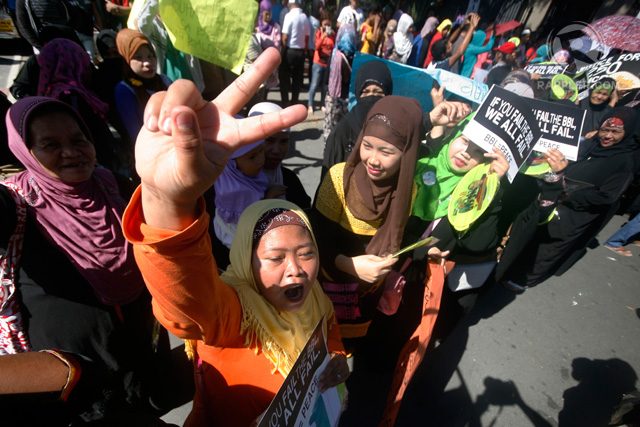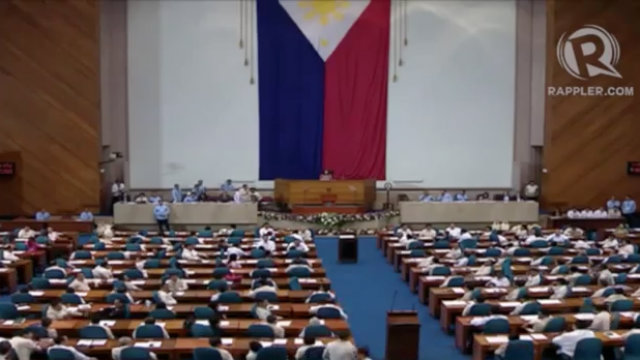SUMMARY
This is AI generated summarization, which may have errors. For context, always refer to the full article.

MANILA, Philippines – The House of Representatives is set to begin the plenary debate on the controversial bill creating a new autonomous region in Muslim Mindanao on Monday, June 1.
Although the proposed Bangsamoro basic law (BBL) hurdled the committee level with an overwhelming majority, passage of the bill – renamed Basic Law of the Bangsamoro Autonomous Region – at the plenary is not expected to be smooth-sailing, House Majority Floor Leader Neptali Gonzales II said in a radio interview Sunday, May 31.
At the top of concerns over the 91-page document is the provision allowing cities and provinces sharing a common border with the Bangsamoro to join the plebiscite – 5 and 10 years after the creation of the Bangsamoro – through a petition signed by at least 10% of registered voters.
Deleting the opt-in clause would give the Bangsamoro bill a greater chance of passing the House, Gonzales said.
“The modification – the (Moro Islamic Liberation Front (MILF)) may not be happy with it but what is happening now, it does not appear to be a deal breaker for them but what is happening is it is a deal breaker for many congressmen. What votes are needed to pass the BBL? It’s not the vote of the MILF but the vote of congressmen,” Gonzales told radio dzBB.
The Bangsamoro bill is part of the implementation phase of the peace deal between the government and rebel group MILF, signed in March 2014. In exchange for the creation of a new autonomous region with greater powers and resources, the MILF agreed to decommission their firearms.
The original version of the opt-in provision allows contiguous municipalities, cities, provinces and other geographic areas to file a petition to join the Bangsamoro at any time, raising fears about a possible “creeping expansion” of the proposed autonomous region.
The special committee in the House created for the proposed law had agreed to delete this provision. Even the Malacañang-backed Peace Council, which reviewed the bill in the aftermath of the Mamasapano clash, suggested the removal of the same clause.
But the provision was reinstated after House leaders met with President Benigno Aquino III before the committee voting. Changes were however introduced as the committee limited the number of times that the plebiscite to join the Bangsamoro can be conducted – every 5 years and 10 years and nothing more after. The committee version of the BBL also limited local government units that can join to only provinces and cities, excluding municipalities and other geographical areas, and defined “contiguity” as land borders, not water.
Committee leaders also introduced an additional limit. Aside from being contiguous, the province and the city must be among the areas mentioned in the Tripoli Agreement of 1976, the first agreement signed between the government and rebel group Moro National Liberation Front (MNLF) under the auspices of the Organization of Islamic Cooperation.

Session extension
With only two weeks left before the end of the second regular session, the House of Representatives is set to extend sessions until Friday, June 5. Lawmakers usually hold sessions in plenary until Wednesday.
Ako Bicol partylist Rodel Batocabe told radio dzBB Sunday that Speaker Feliciano Belmonte Jr has already sent out notices to lawmakers.
Cagayan de Oro Representative Rufus Rodriguez, chair of the House ad hoc committee on the Bangsamoro, is set to deliver his sponsorship speech on Monday.
The House is also open to starting sessions at 10 am, instead of the usual 4 pm, to meet the deadline to pass the proposed law by June 11.
The length of discussions on the Bangsamoro bill will depend on the number of lawmakers who would want to participate, Gonzales said.
Gonzales said the House leadership is working through party leaders in determining whether there is enough support for the bill.
He admitted that he could not guarantee 100% support even from the administration Liberal Party. In the House, other political parties such as the Nacionalista Party, Nationalist Peoples’ Coalition, and the National Unity Party and a 40-member party list bloc all belong to the majority bloc.
Positions in the House are “divided,” Gonzales said. At the committee level, members of the majority voted as a bloc to pass the BBL and block proposed amendments from opponents.
With the 2016 elections in the horizon, Gonzales said that the political survival of House members will determine how they would vote for the BBL, especially for those who will seek reelection or run for local posts.
In one party caucus of the LP, Gonzales said one congressman revealed that his local survey showed that 80% of his constituents were against the BBL.
“How can you tell him to toe the political line when his political survival is involved? And for (members from other parties), they will tell us, what is your moral suasion to pressure us to vote if you can’t even convince your own members?” Gonzales said.
A Pulse Asia survey in March found that nearly 5 in 10 Filipinos were against the passage of the BBL. A Social Weather Stations survey released in May meanwhile found that nationwide approval of the bill was at 44%, with the highest in core areas.
More time needed to study the bill?
Batocabe, spokesperson of the 40-member party-list bloc in the House, earlier said they have not formed a consensus on the BBL.
The party-list lawmaker admitted that most of their members have yet to read the latest version of the bill. Of the 40 members, Batocabe said only about 10 have read the BBL in full.
He himself has just started reading the latest version of the BBL, he said. Only 4 members of the party-list bloc were members of the 70-member ad hoc committee.
“It’s a new version. We don’t know what was taken out. There’s a new version passed by the committee. After the meeting with the President, the version was changed,” Batocabe said.
At the Senate, meanwhile, Senator Ferdinand Marcos Jr, chair of the Senate local government committee, is set to hold the final committee hearings on the BBL on Tuesday, June 2, with women and other sectors, and Wednesday, June 3, with local government executives.
Unlike the House, the Senate does not appear dead set in beating the June deadline. Senate Franklin Drilon himself has admitted that it would be difficult to do so after Marcos decided to hold more hearings, and after the release of Senator Miriam Defensor Santiago’s report declaring the BBL as unconstitutional. A total of 12 senators signed the report, with 5 of them co-authors of the bill.
Once the BBL is passed in the House and the Senate, it will go through the bicameral conference committee to reconcile conflicting provisions.
Should Congress approve the BBL, it will go through a plebiscite in core areas of the Bangsamoro for ratification.
Once ratified, an MILF-led transition body will take over until the election of the first set of officials in 2016. There is less than one year left before the May elections.
The BBL seeks to install a more powerful autonomous region in a bid to end more than 4 decades of war in Mindanao. – Rappler.com
Add a comment
How does this make you feel?
There are no comments yet. Add your comment to start the conversation.